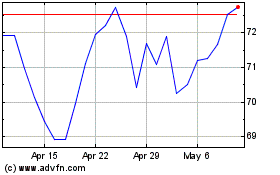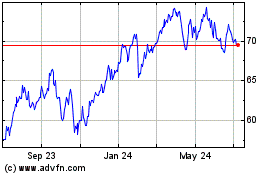U.S. Oversight of MetLife Called Into Question at Court Hearing
October 24 2016 - 2:32PM
Dow Jones News
By Ryan Tracy
WASHINGTON -- U.S. oversight of MetLife Inc. was called into
question Monday at a court hearing where the Obama administration
sought to reassert the federal government's authority to regulate
the large insurance firm.
Judges at the U.S. Court of Appeals for the District of Columbia
Circuit asked pointed questions to government lawyers and at times
appeared to express sympathy for MetLife during a hearing that
lasted more than an hour.
But the three-judge panel pushed back on some of MetLife's
arguments as well, and didn't clearly indicate its direction for a
final decision. It could take months before the panel issues an
opinion.
The Financial Stability Oversight Council, a group of senior
regulators known as FSOC, is appealing to the court to reassert
federal oversight of MetLife. It voted in December 2014 that the
company was a "systemically important financial institution"
deserving of stricter regulation, but U.S. District Judge Rosemary
Collyer earlier this year overruled that decision, saying it was
unreasonable and based on a "fatally flawed" process.
Judge Collyer was appointed by President George W. Bush.
The panel hearing Monday's arguments included two appointees of
President Barack Obama, Judges Sri Srinivasan and Patricia Millett,
as well as Judge A. Raymond Randolph, an appointee of President
George H.W. Bush.
Beyond issues related to MetLife directly, the case holds
broader significance.
The ability to bring large financial companies such as MetLife
under tougher rules was an important piece of the 2010 Dodd-Frank
financial overhaul. The law created the council to watch for gaps
in financial regulation and to tag financial companies for stricter
oversight if it determined their failure could put the broader
economy at risk.
Judge Collyer's decision, if upheld, would call into question
other instances where the Obama administration has used that
authority, especially in the cases of American International Group
Inc. and Prudential Financial Inc.
The Obama administration is also trying to protect the legacy of
Dodd-Frank. The law has faced other legal challenges as well,
including a recent ruling finding the structure of the Consumer
Financial Protection Bureau unconstitutional.
During Monday's hearing, Judges Millett and Srinivasan
interrupted Mark Stern, an appellate litigation counsel at the
Justice Department, several times to ask how his arguments were
supported in public statements the FSOC has made. The judges could
rule in MetLife's favor if they decide the regulators didn't
adequately explain their procedures or reasoning.
Judge Millett, when discussing MetLife's contention that the
FSOC hadn't adequately supported its conclusions, said part of the
company's argument seemed "reasonable enough."
"You can't just say [MetLife] is so big" that if it fails, bad
things will happen, she told Mr. Stern. "You're not specific enough
when you say, 'It's a really, really bad situation... so we assume
that bad things are going to happen.'"
Mr. Stern said the FSOC did extensive analysis to support its
decision.
Lawyers for MetLife and the government also clashed on the
question of whether the oversight council should have analyzed the
likelihood that MetLife would find itself in deep economic
distress.
Judge Randolph said the FSOC, by assuming MetLife was in trouble
and then assessing the consequences, essentially predicted "there
was a 100% chance" MetLife would fail.
Mr. Stern said the FSOC had a responsibility to assume the worst
because financial crises, by their nature, are unexpected. He
pointed to distress at AIG in the lead-up to the 2008 crisis:
Probably the only people that would have predicted AIG's collapse,
he said, "were the guys in 'The Big Short'," the book and movie
about the handful of investors who foresaw the housing crash.
Eugene Scalia, partner at Gibson Dunn & Crutcher LLP
representing MetLife, said there was no "explicit statutory
compulsion" for the FSOC to assess the probability that MetLife
would fail, but it is still unreasonable for the government to
punish the company without analyzing that question.
Mr. Scalia also faced some pushback from the judges. Judge
Millett disputed his characterization of part of the FSOC analysis,
saying it was "much more comprehensive" than the MetLife lawyer was
suggesting.
Judge Srinivasan told Mr. Scalia that Congress gave the FSOC
flexibility, so perhaps the group wasn't "out of bounds" for
ignoring some of the issues raised by MetLife.
Mr. Scalia said the FSOC violated the legal requirements that
govern how federal agencies must make decisions, for example by
ignoring expertise offered by insurance experts and not analyzing
the impact its decision would have on MetLife.
Write to Ryan Tracy at ryan.tracy@wsj.com
(END) Dow Jones Newswires
October 24, 2016 14:17 ET (18:17 GMT)
Copyright (c) 2016 Dow Jones & Company, Inc.
MetLife (NYSE:MET)
Historical Stock Chart
From Mar 2024 to Apr 2024

MetLife (NYSE:MET)
Historical Stock Chart
From Apr 2023 to Apr 2024
